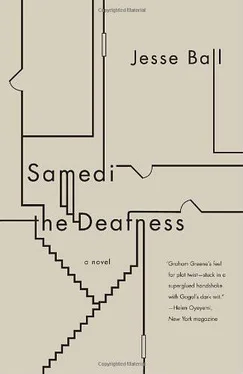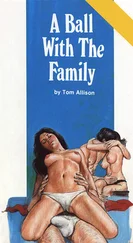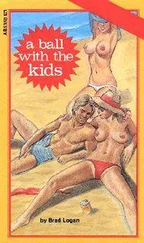As he sat her words, her lies, her hopes ran through him, ran beside the running of Stark's words, the thousands which were strung up fresh and wide and somewhat cruel, the Ss like sickles, the Is like gun barrels. Violence, thought James, what is the change. I don't see how violence is any change at all. And Grieve's words blended into a sort of song, and he felt his life, his responsibility was not to the larger world, but to this small one, this thing they were creating. Her words came again, came and went, came again, lies and wishfulness. He peopled the space between her words with things he thought could compose a day. Who could compose a day? A day in all its intricacy, a day like a polished wooden toy made long ago and left in its perfection in the window of a shop. . And Grieve was with him, and her hands were cold. Her hands were cold; her hands were thin. Who was she? What could it be to them, this catastrophe? There was no doing of things for them, only undoing, only gathering together and bringing forth again.
In such thoughts they lay, speaking, murmuring, drowsing, and passed into sleep.

James woke. He was in his room. Grieve was gone. It was very quiet. As quiet as it had ever been.
The light through the window was an afternoon light. What happened? he thought. Did they leave me? Did they let me sleep?
He pulled a shirt over his head and went to the door. He opened it. There were no notes on the shelf.
The hall too was empty. He went down the stairs. There was no one about, no one at all. He began to run. He ran along the halls; he ran upstairs, downstairs. He went up the fourth staircase to Stark's room. It was empty, the long space replying with the same household quiet.
— Have they left me?
The thought came to him: they were in the bunker.
He ran down the first set of stairs, down the second, the third, the fourth. He turned and made his way down the hall. He found the door and the stairwell down to the wine cellar. The stairs were much longer than he had remembered, and seemed to curve. But at the bottom, the cellar was the same, glowing lights and stretching rows of bottles.
The door is here somewhere, he thought. I have to find the door. He began methodically to go up and down the rows, looking on the ground for a trapdoor, or on the wall for an entrance. He saw nothing. Row after row and still nothing.
His head became feverish. His vision swam. It must be here somewhere. Stark said it was here somewhere.
Then in the second-to-last row, on the far end, far away in the dark, where there were no glow bulbs, he saw the outlines of a door.
That's it. He ran to it.
The door was quite wide, one and a half times the width of an ordinary door. There was a handle in the middle. James pulled on it. The door didn't budge.
They've locked me out, he thought. God damn it.
He pounded on the door, pounded with his fists, kicked it with his feet.
They've locked me out.
He pulled on the door again. He took bottles from the shelves and hurled them at the door, where they shattered and littered the ground with shards.
It's no good. They won't open it.
He went to the door, stepping carefully through the broken glass. He put his ear against the door.
Faintly, faintly, he could make out the sounds of an argument.
He heard Grieve's voice, and the voice of her father.
— We have to let him in. If we open it for just a second. We have to.
— No, said Stark. The door is closed and sealed. It will not be opened again. The matter's closed.
— But he's out there.
James could hear Grieve crying. Then he heard the scuffle of feet.
— NO! Stop her.
Stark's voice was loud.
What's happening? thought James. Grieve must be trying to open the door.
— I've got her.
It was McHale's voice.
— Grieve, Grieve. Calm down. It will be all right; I promise.
— I hate you, she said. I hate you all.
— You'd better give her a shot, said McHale.
— Noooooooooo! No!
Grieve was screaming, and then she was not.
James pounded and pounded on the door. His hands ached. It was useless.
James stepped away from the door. It was useless to stand there. He made his way back across the wine cellar and up the stairs. Then he was in the hall.
Outside, he thought. I shall go see what's outside.
He went by the front entrance, and out the door.
The first thing he saw was the city, on fire, in the distance. At least half the city burning. The smoke was everywhere, with a hot red core.
Dear God, he thought, and looked up.
Above, pale, wispy clouds covered the sky like ribbons.
The clouds, he thought. Those are the clouds. He recoiled in horror. Then the noise began. He heard it in his ear, in the space behind his eyes; he heard it on the planes of his face, and in his mouth. Singing. A great noise of singing, like a chorus. The sound swelled. It hurt. The pain grew. He fell to his knees. All along the avenues cars were still, smashed into one another, smashed into walls, smashed into houses. Fires grew, consuming buildings, houses. People fled, screaming, lost to the sound of their own voices.
On the lawn James lay, and the pressure of the sound of singing grew in his head. It grew and grew, and he thought then that he might die. But then it stopped, and everything was silent.

— James, James! Wake up!
James opened his eyes. He was lying in a bed built into the wall of a long, airy room with broad windows. They were thrown open and a light breeze was blowing.
A girl was standing there, beautiful, with short black hair and bright eyes. She was dressed as if to travel, in a wool skirt with knee socks, a short fleece coat, and a scarf. A cat was under her arm. It too was looking at him.
— James! she said. Everyone's waiting for us. It's time to go.
She came over to the bed and leaned over him. Her face was very close.
— Come on, you! Come on. The light is changing. Father says we have only minutes before it begins.
Nov 2005
the end
appendix a Note on the Naming of Characters
In Scotland, in a town called Rosewell, there is a small cemetery. I lived for a month nearby.
I would go sometimes to the cemetery in Rosewell, and for this novel, as a tribute to the land on which I wrote this book, and to the people there, I have named many of my characters out of the cemetery.
Most of the names I chose were men who died in mining accidents, though some died in the Great War, others in their sleep.
Nothing in the book has anything to do with the lives these men and women led. I felt a gratefulness to the place, to Hawthornden, Rosslyn, the River Esk, and to this Rosewell graveyard, and it seemed the right thing to do to fill my book with the vague shapes of their letters.
Here is a list of the names I found there.
James Carlyle
John Sutherland
Cpl. Arch Renwick, died in France, age twenty-one, 1918
James Sim
Pat Jordan, died at Kelty, 16 April 1929
Grieve Cochrane
Will Watson, killed at Whitehill Colliery, 10 June 1929
Andrew Morris, Whitehill Colliery, 1934, age twenty-four
Samuel Mathieson, Whitehill Colliery, 1940
Charles Higinson, Whitehill Colliery, 1935, age twenty-one
Leonora Loft
James Leslie
Lily Violet
Martin Stark, died at Hawthornden, “There is no death”
Robert Wallace Wight, killed at Bilston Glen Colliery, 1965
Spiers Jones
John Clechorn, age twenty-one, “who fell asleep at Midfield Cottages” 12 October 1908
Читать дальше













